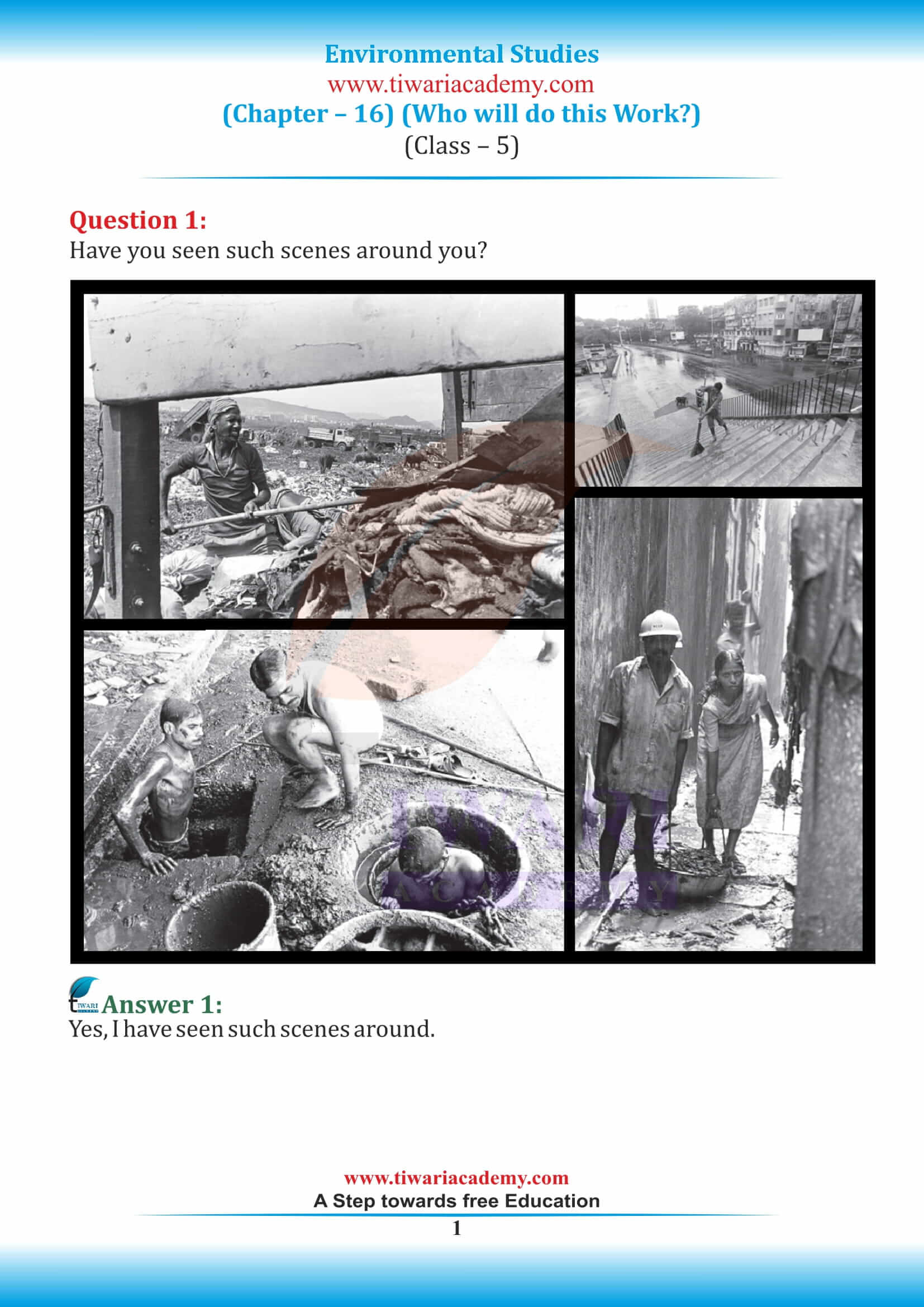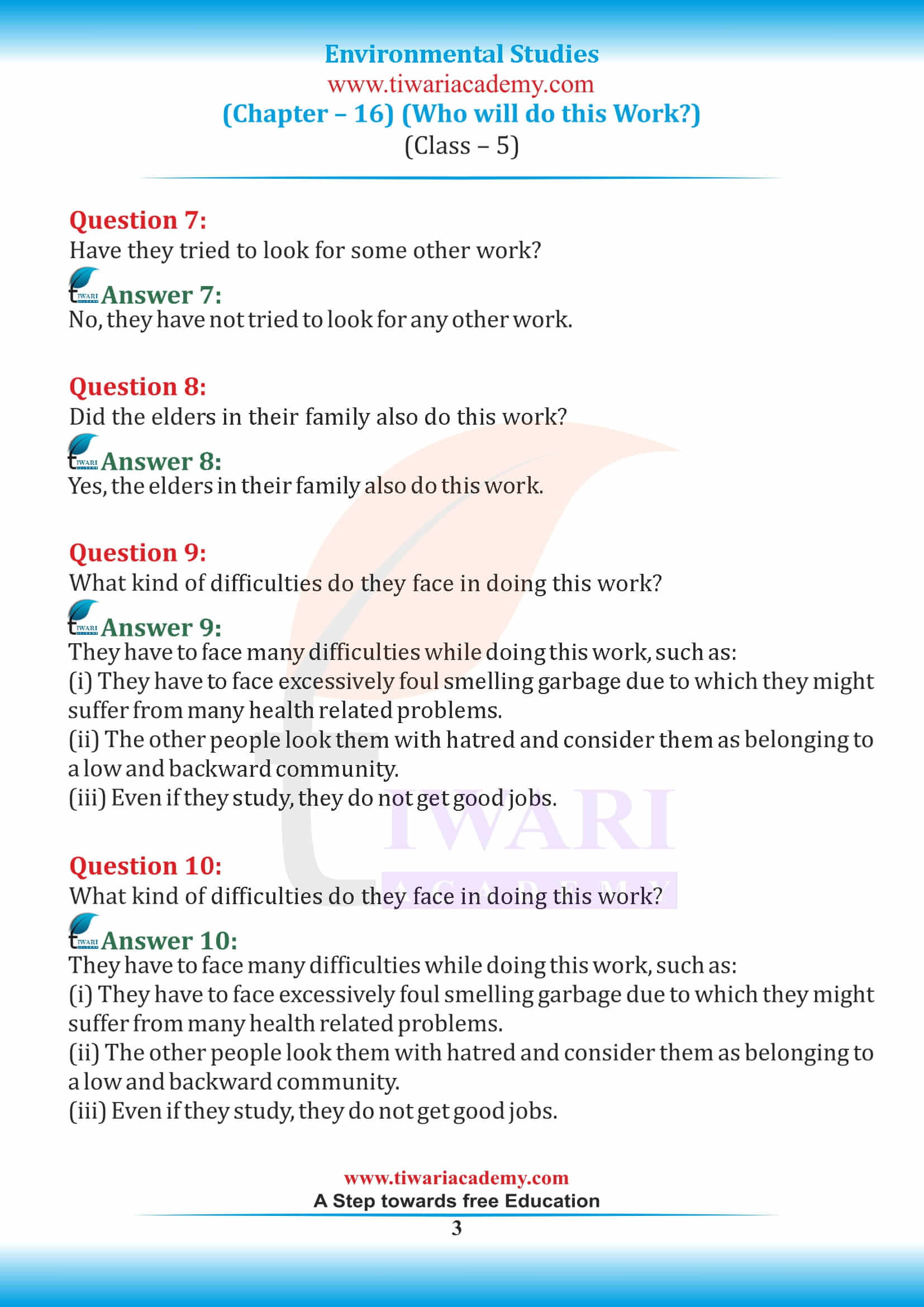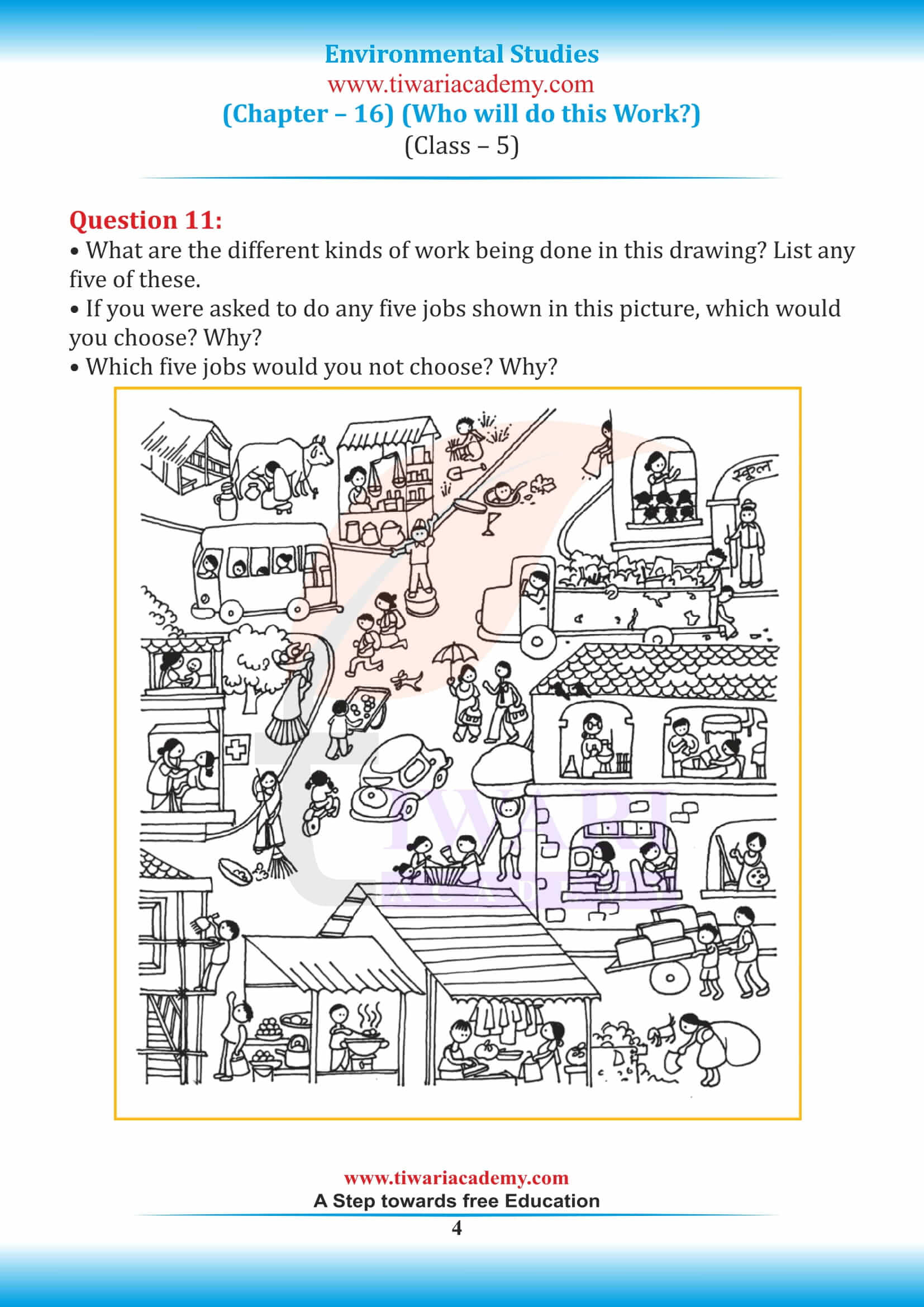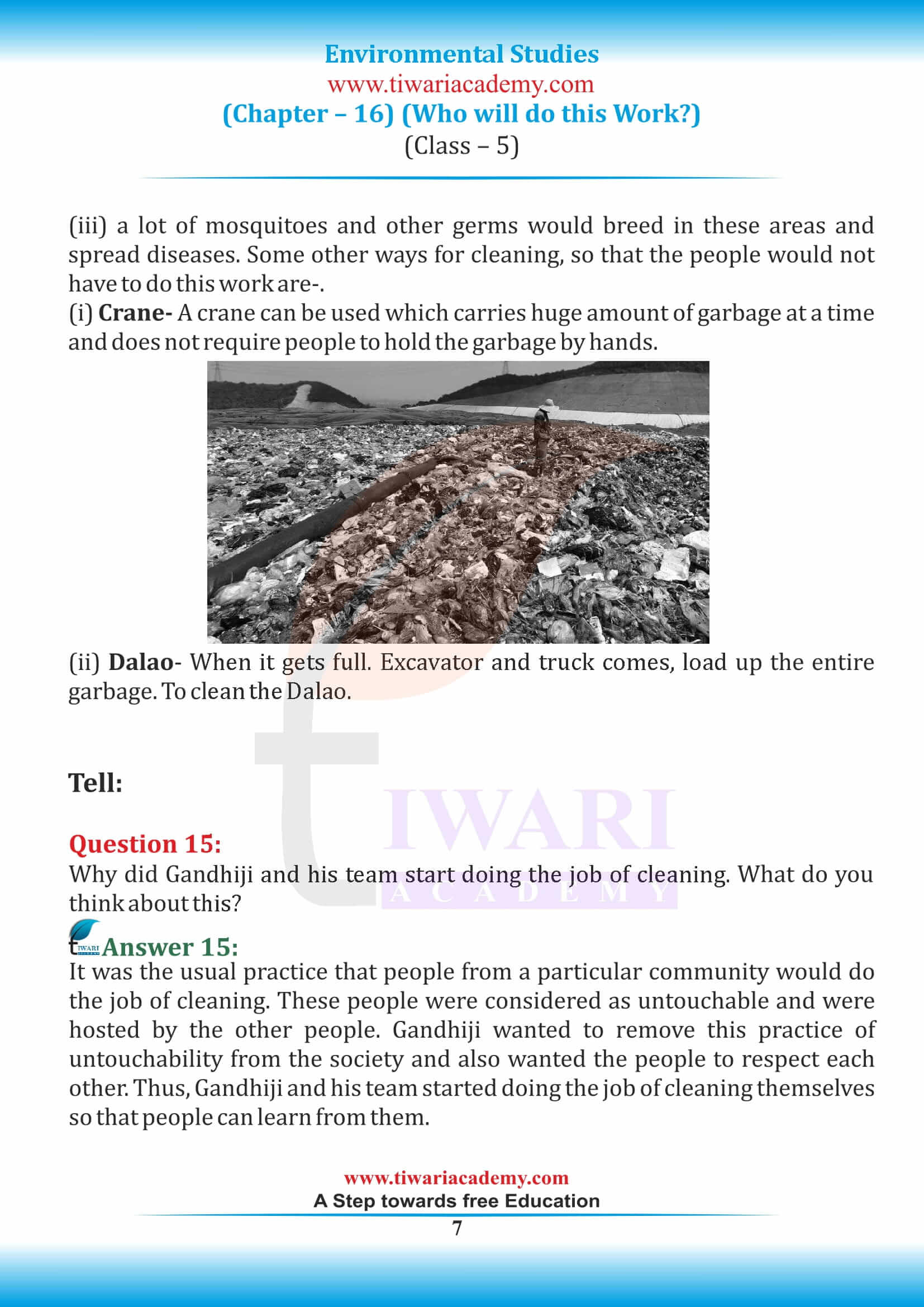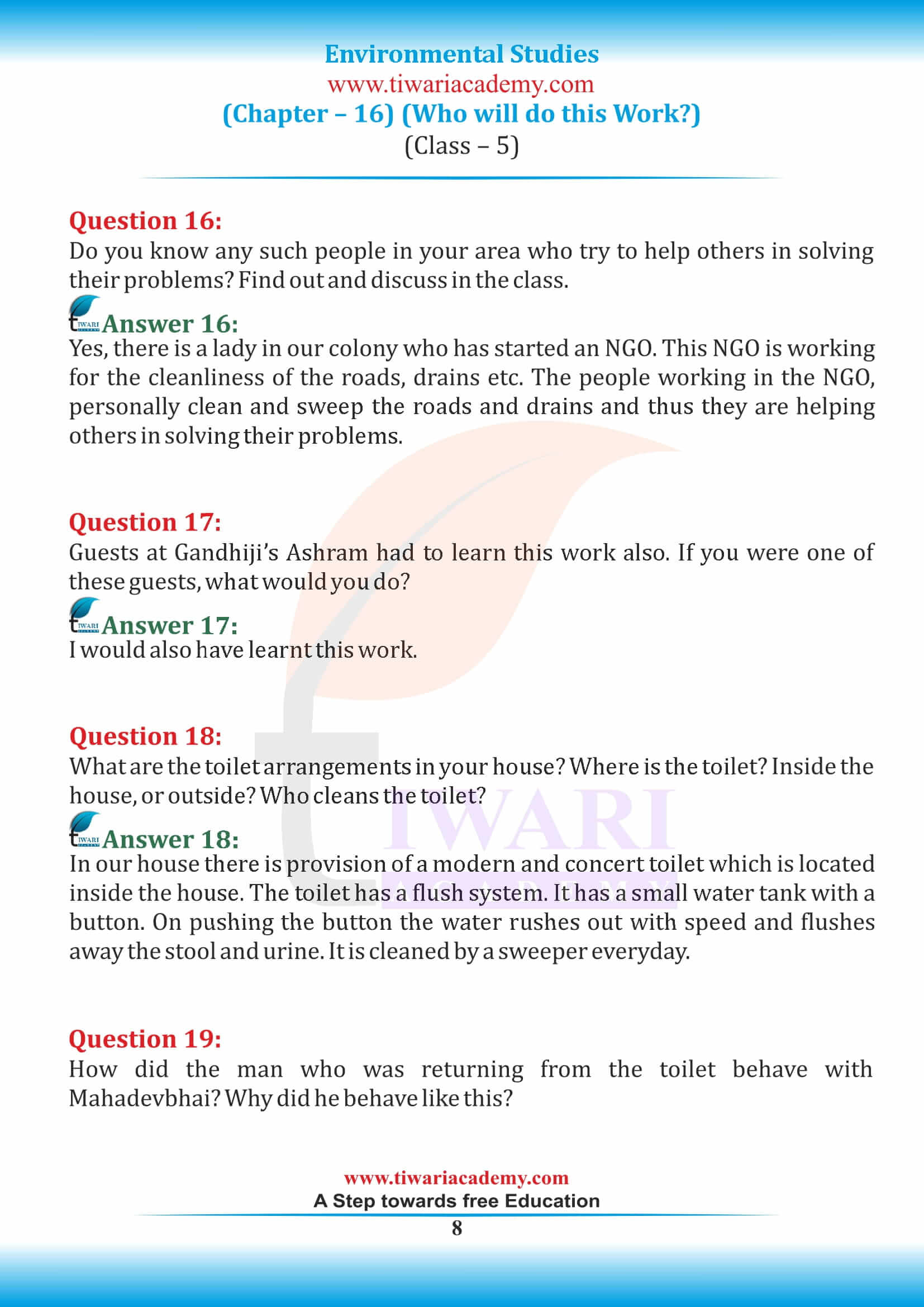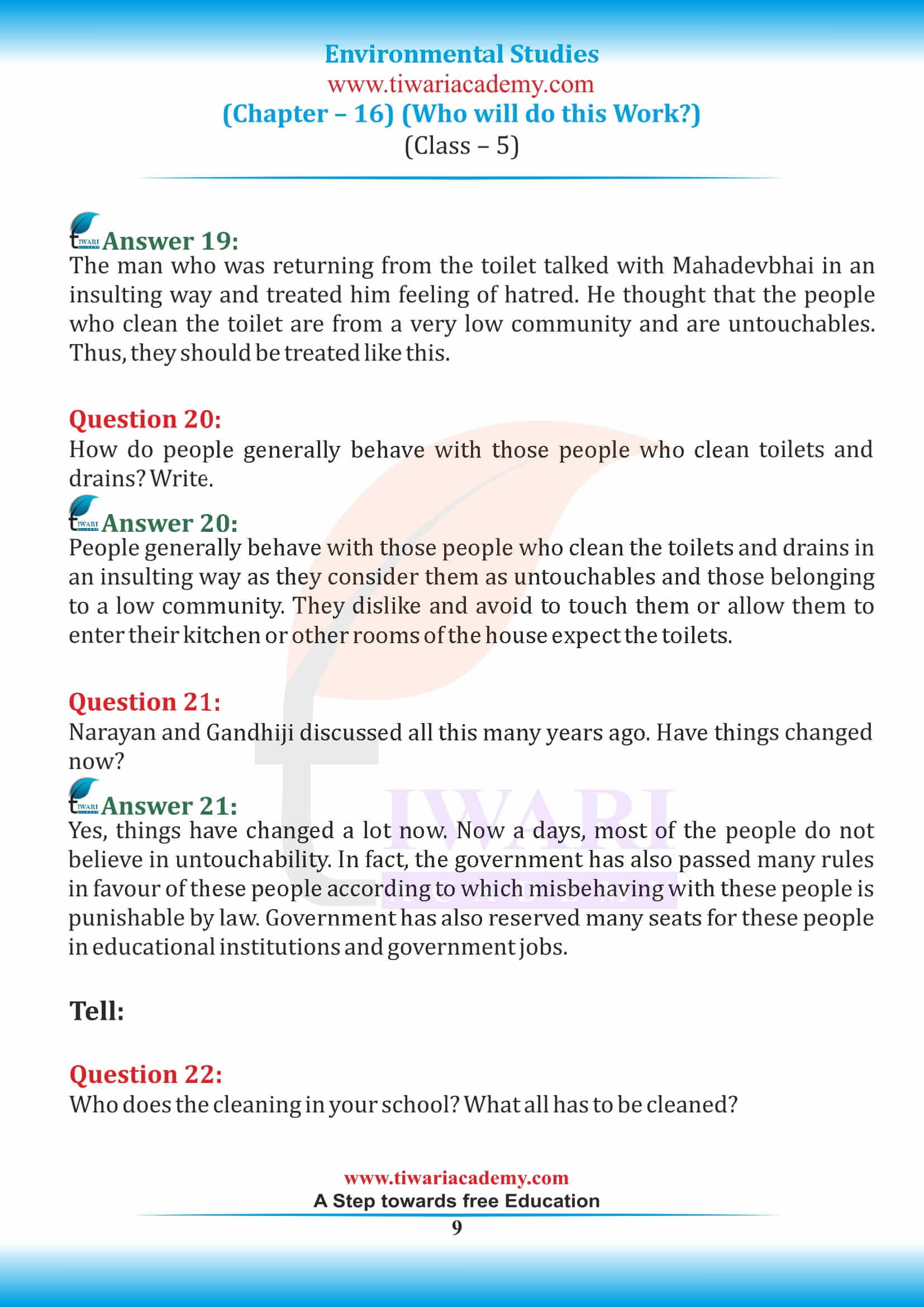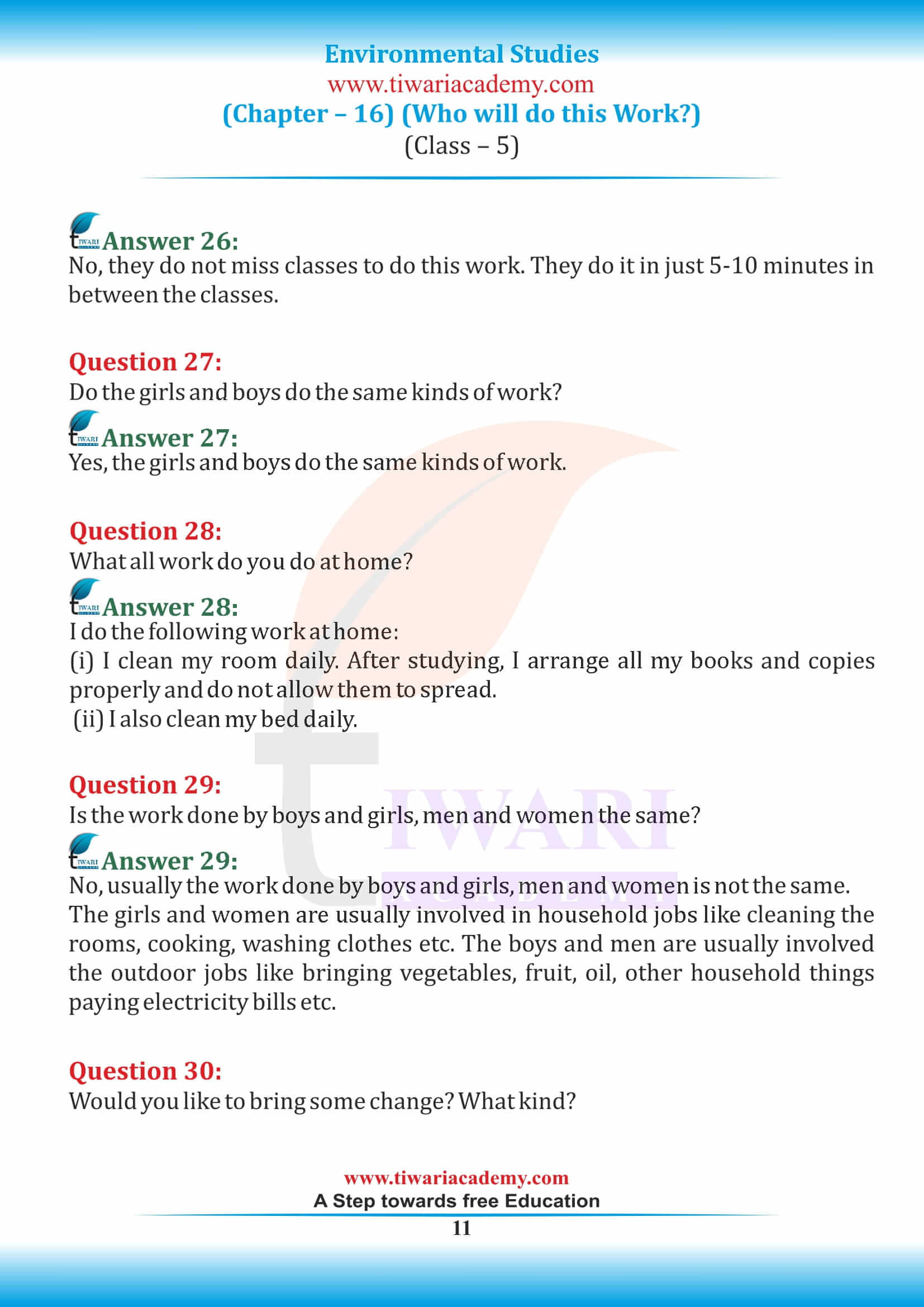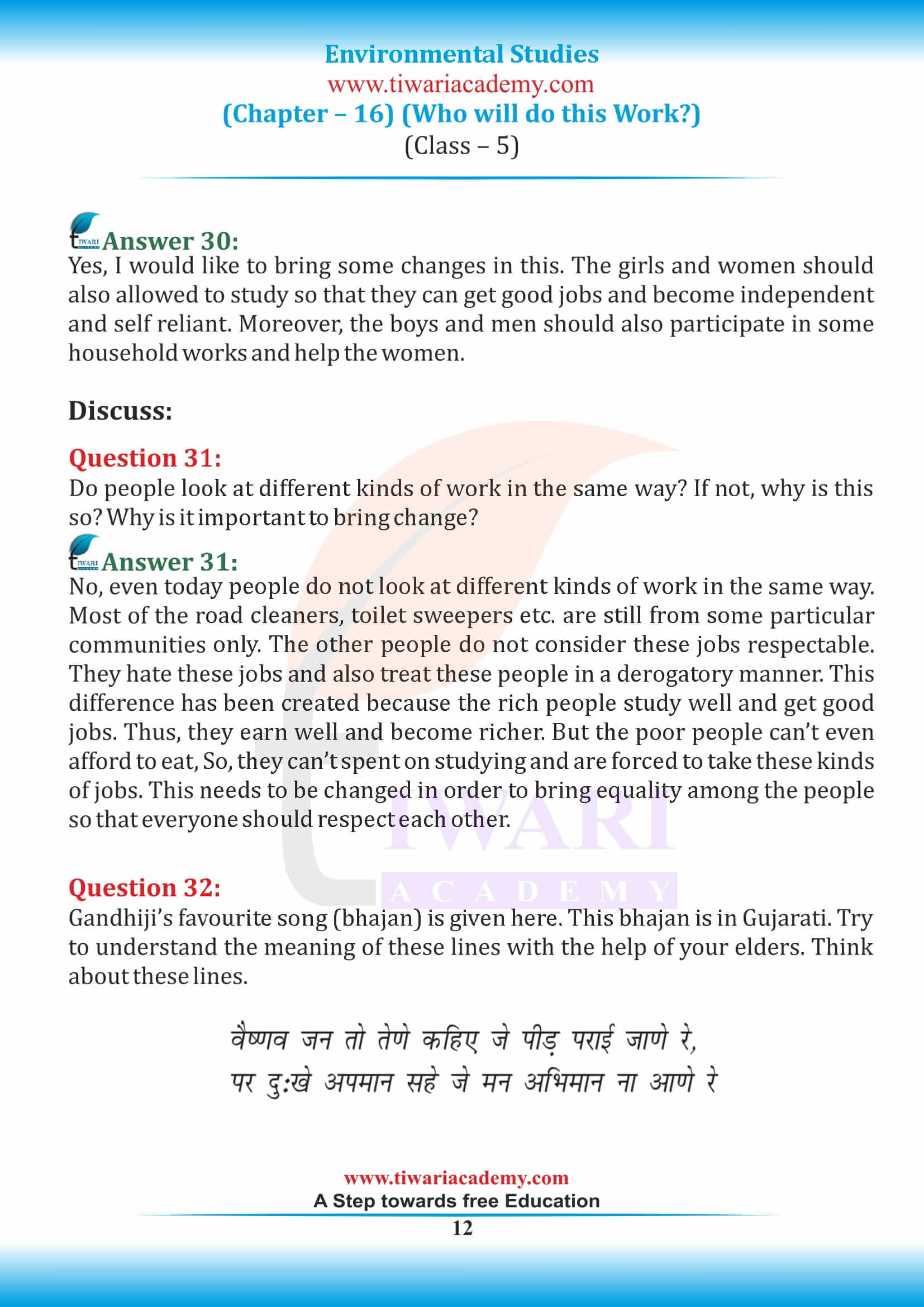NCERT Solutions for Class 5 EVS Chapter 16 Who will do this Work? in Hindi and English Medium Updated for new academic session 2024-25 free to use online or download in PDF file format. After completing the chapter using NCERT Exercises questions answers, students should go for Extra questions which help in revision as well as to prepare the chapter for unit tests or term exams.
NCERT Solutions for Class 5 EVS Chapter 16
Class 5 EVS Chapter 16 Question Answers of Who will do this Work
Class 5 EVS Chapter 16 Question Answers Set 1
What is meant by dignity of labour?
Dignity of Labour means that all occupation, whether involving intellect or physical labour, needs to be given equal respect and dignity. A person should never be favoured or discriminated on the basis of his occupation.
What is division of labour?
Different people do different kinds of work. This is called division of labour. Division of labour is the separation of a work process into a number of tasks, with each task performed by a separate person or group of persons.
How should you treat the people who help you?
Instead of judging people by their past, stand by them and help them build their future.
• Treat everyone with kindness
• Be polite to them
• Help them and show respect towards them
• We should treat the people as our equal
What is work?
Work is a job that a person does mostly in order to earn money.
Why should we not be ashamed to any work?
Work is worship and no work is high or low. So, we should not be ashamed do any work. We should not be ashamed to do any work. We must concentrate on our own work. We should be proud of it and do it with dignity and always give best and never lose hope.
Who are untouchables?
In our society people who do menial work are regarded as lowly and are placed at the lowest level of the social ladder. They were called as untouchables. Gandhiji named untouchables as Harijans, Harijans means people of God.
What do you understand by essential services?
The services that we depend upon or we need every day in a society are called essential services. The essential services are postal, telegraph or telephone service, railway service or any transport service for the carriage of passengers or goods by air and any service connected with the operation or maintenance of aerodromes, any service in any major port.
Why do we need essential services?
We all are dependent on one another to provide essential services needed in a society. None of us can do all the work by ourselves. Different people do different work so we should never look down others work.
Question:
Why are essential services important?
Answer:
Government is responsible for providing the essential services like education and health care. Essential services are those services which are essential for:
- health & welfare of a people
- maintaining in times of emergency/disaster.
- Providing a comfortable life to the people
- Providing people with the basic necessities to all.
Class 5 EVS Chapter 16 Question Answers Set 2
Who was Mahatma Gandhi?
Mohandas Karamchand Gandhi also called Mahatma Gandhi was an Indian lawyer, politician, social activist, and writer who became the leader of the Indian nationalist movement against the British rule in India. He is also called Bapu and known as the Father of the Nation.
What did Mahatma Gandhi do for the untouchables?
Gandhiji came to India from South Africa and saw that caste system was prevalent in the country. People treated the untouchables very badly and denied them of their basic rights. He believed that if people followed untouchability then it would divide India’s social classes. Gandhi worked for the freedom of the untouchables, whom he called Harijans, or “Children of God.” Gandhiji did the following things for these people:
• In September 1932, while he was in jail, he undertook a “fast unto death” to improve the status of the Hindu Untouchables.
• He organised satyagraha to secure them entry into temples and access to public wells, tanks an d schools.
• He himself cleaned toilets to dignify the work of the sweepers and persuaded upper castes to change their heart and give up the sin of untouchability.
Who was Dr. B.R. Ambedkar?
Dr. Bhim Rao Ambedkar is called the father of the Indian Constitution and was also a well- known leader of the Dalits. He fought for the rights of the Dalit community. He was born into the Mahar caste, which was considered untouchable. He fought for the justice of the people who were treated as untouchables. He was the chairman of the drafting committee of our constitution.
Question:
Why do people do different types of jobs?
Answer. People do different types of jobs because-
• Lack of education makes them unfit for doing most of the jobs.
• Lack of opportunities also makes people do different types of jobs
• Different interests and different mind-set of people is another reason.
• Different types of professional courses
• Trainings of various types
Question:
Why are people forced to do menial jobs?
Answer: People are forced to do menial jobs because of-
• Poverty or lack of funds
• Lack of good education
• Circumstances and family background
• Lack of interest in studying which keeps them backward
• Low status
• Being deprived of good education
• Being forced to earn at a small age
• Being jobless and not getting any other work.
Class 5 EVS Chapter 16 Question Answers Set 3
What are menial jobs?
Menial job is very boring, and the people who do it have a low status and are usually badly paid. There are many low-paid menial jobs, such as cleaning and domestic work. It is a job that does not require any skill or professional degree or education.
Who was Narayan (or) Narayan Bhai Desai?
Narayan Desai was a follower of Gandhiji. He was the son of Mahatma Gandhi’s personal secretary and biographer Mahadev Desai. He was born in Bulsar (now Valsad), Gujarat. He was an author and wrote many books about the ideas and life of Gandhi.
What was Narayan told to do in the ashram?
When Narayan was about 11 years old, he used to stay in Gandhiji’s Sabarmati Ashram. There he had to do various kinds of work. One of his jobs was to teach the guests how to clean the toilets.
What is the importance of Sabarmati Ashram?
Sabarmati Ashram which named after the river on which it sits, was created for two reasons.
• To serve as an institution that would search for truth and
• a platform to bring together a group of workers committed to non-violence who would help India secure freedom.
Question:
Why do some people do cleaning jobs despite of being educated?
Answer:
Some people do cleaning job despite being educated due to the following reasons:
- Increase in population- Due to increase in population worldwide there is huge competition for a single post.
- Lack of job opportunities as per the skills and expertise- As the job opportunities are few, which cannot employ a huge population having skills and expertise in accordance with the job.
- Lack of skills and expertise required for the job. Many people lag behind because they do not have required skills for the job.
Thus, the unemployed educated people try to fetch any kind of job like cleaning, washing, cooking, so that at least they will be able to obtain some money.
Class 5 EVS Chapter 16 Question Answers Set 4
What is our responsibility to keep a place clean?
Keeping a place clean and neat is our responsibility. It is necessary to keep our environment clean because we get fresh air, reduce pollution etc. An unclean environment leads to a bad condition of a society, diseases etc. Keeping the environment clean is a collective responsibility which we all have to share. Every citizen has a role to play in protecting the environment from pollution. We need to remove litter and avoid irresponsible waste disposal practices as soon as possible. We need to reduce, reuse and recycle our waste wherever possible.
Why are people not ready for menial jobs?
People are not ready to do such jobs because they are considered inferior by other people and they are not treated with respect too. Some are not ready to such jobs because they are getting educated and have other options for job too. They want to earn more money for themselves and live a better life. That is why they don’t want to work as sweepers, dish washers, sewage cleaners etc.
What are the difficulties faced by the people who do menial jobs?
The people who menial work like cleaning, scavenging etc. face many difficulties like-‘
• they have to work in unhygienic conditions
• they are often treated badly by other people
• they are not given any respect
• people don’t speak politely with them
• people look down upon them and keep hatred for them
• they are not paid properly.
Question:
What would happen if people do not do their work?
Answer:
If the people do not do their work it will be a great problem for everyone as there will be:
• no cleanliness, garbage will get collected everywhere
• there will be bad smell everywhere
• diseases will spread
• there will be pollution everywhere.
Class 5 EVS Chapter 16 Question Answers Set 5
What did Gandhiji want to teach people?
Gandhiji wanted to make people understand that there is nothing bad in doing any type of work. He wanted to change the view of the people about the people who did such jobs or considered these jobs of low status. He wanted to remove untouchability from our country. He wanted to convey that all work is equal as well as important and nothing is big or small.
How were the people cleaning toilets treated?
People who were cleaning the toilets were treated badly. They were looked down upon and people spoke to them with hatred. They spoke with them rudely and with disrespect. They were insulted by them and disliked by them. They were not allowed to enter the temple or kitchen etc.
What were the tasks performed by the girls?
The girls were supposed to perform all the household chores like cooking, sewing, washing clothes, ironing clothes etc.
What were the boys supposed to do?
Boys were supposed to repair an electrical fault, repair cars etc, lift or move heavy things. It was believed that there are certain tasks which needed to be done by men only.
Was it justified to practice untouchability?
Untouchability was a wrong practice because no one is born big or small. Everyone is born equal and thus to consider someone as of low status or high status is completely wrong. It is not right to deny any one the right of entering a temple or taking water from the well and calling them untouchables.
Class 5 EVS Chapter 16 Question Answers Set 6
Why were some people not interested in living in Gandhiji’s ashram?
Some people were not interested in living in Gandhiji’s ashram because there were no toilets during those days. People used to sit on holes under which there were baskets which had to be emptied with hand. It was a usual practice that people from a particular community would do this work. But in Gandhiji’s Ashram, every person had to carry the basket to the compost pit and empty it there. No one was excused from this task, not even the guests. So, some people used to try and avoid this work. Some even left the Ashram because of this.
What does ‘equality among people’ mean?
Equality is the condition of being equal, especially in status, rights, and opportunities. Equality among people means that every individual has an equal opportunity to make the most of their lives and talents. It means that everyone is equal in the eyes of law and there will be no discrimination on the basis of colour, creed, caste, gender or religion. All will be treated equally whether rich or poor, or educated or uneducated.
Name a right made by Central Government for giving equality to all people.
Article 14 of the Indian Constitution guarantees to all persons Equality before the law and equal protection of the laws.
Which incident of untouchability took place with Dr. B.R Ambedkar in Goregaon when he was young?
When he was seven-years old, he went to Goregaon in Maharashtra with his father to spend his holidays. There he saw a barber cutting the long hair of a rich farmer’s buffalo. He thought of his own long hair and went to the barber and asked for a haircut. The barber did not cut his hair and said that if he would cut his hair both his razor will get dirty/ This was an incident of untouchability which took place with him.
Question:
How were the toilets different from what they are now?
Answer:
In those days, there were no proper toilets and it was just that there used to be holes under which baskets were kept. People used to sit on the holes. Later the baskets had to be lifted by hand, to be emptied.
Why do you think the class 5 EVS chapter 16 is focusing upon the odd jobs that people do?
IF you have read the chapter you will find earlier there are certain problems such as untouchability, discrimination based on, and other problem. Through which people started hating people doing the cleaning works. That is why through the story here book trying to make people understand the cleaning work is as important and respectful as the other jobs and the people are doing it doing the hard work so they should be respected equally.
What are the various ways that you might find is effective to make the people and children understand that they shouldn’t disrespect the people doing all the jobs as per the story given in chapter 16 of EVS class 5?
There are various practices that schools are required to implement to make the children understand why the cleaning is important and how hard it is to keep the area (school, playground, room, home, etc.) clean and maintain. They should be given the work to clean the areas so that they will understand that they should not discriminate against those who do these jobs.
Do you think the stories given in chapter 16 of class 5th EVS are long?
The chapter has multiple stories and conversations too. To make the people understand how the situation is better and now people discriminate less than before. To understand who took the action to eradicate such malpractices in the society and community.
